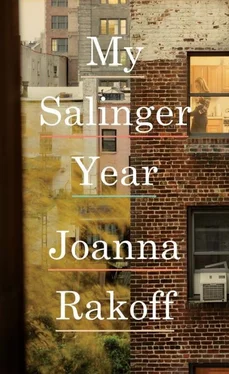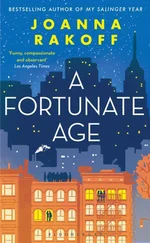On Thursday, I arrived at work to find my boss already ensconced at her desk. The books were gone. “Oh, good, you’re here,” she called as I took off my coat.
“I’m here!” I called back with exaggerated cheer. I had been looking forward to that half hour in the office alone. Lately, I’d been coming in earlier and earlier to bask in the cool quiet of the office. Sometimes I caught up on work. Sometimes I just sat at my desk and read, drinking coffee and slowly unpeeling a sticky bun from the ersatz Italian market in Grand Central. Sometimes I worked on poems, typing them up on my Selectric.
“Now,” said my boss, making her way to my desk, “how would you like to read something? A manuscript? I’d need it read very quickly. Tonight.”
“I’d love to,” I said evenly, trying not to smile. I had been waiting for this moment.
“You’ve heard of Judy Blume?” asked my boss, her brow furrowed.
How was I having this conversation again? “Yes,” I said. “I’ve heard of her.”
“Well, this is her new novel. I don’t quite know what to make of it.”
“Great!” This didn’t surprise me. My boss, as far as I knew, had no children, and she—like a certain breed of adult—appeared to have never been a child herself, but rather to have materialized on earth fully formed, in a taupe-hued pantsuit, cigarette in hand.
“Can you read it tonight?”
I could.
That night, I arrived home at twilight, my coat under my arm—the days getting longer, the air warmer, though still not warm—and found a letter waiting for me atop the radiator in the hallway of the building that fronted ours. My breath stopped at the sight of my college boyfriend’s small, neat hand, the blue ink from his fountain pen, the fountain pen I had given him a year earlier.
Quickly, I stuffed the letter in my bag, a black leather carryall I’d bought in London, flat alongside the manuscript, and willed my heart to stop beating so loudly and quickly. I wanted terribly to rip it open, right in the hallway, and devour it—though I suspected it would not be the kindest of missives—but I also couldn’t bear the thought of doing so, not with Don potentially waiting for me in the apartment, hunched over his laptop. It was not that I feared he’d be jealous. It was that I couldn’t risk succumbing to the wave of emotion that would surely hit the moment I read the first line.
We were supposed to go to a party that night, Don and I. We were always supposed to go to a party. Parties at the fancy apartments of my college friends’ parents or at the decrepit apartments in which my college friends actually lived. Parties in lofts: Marc’s huge loft on Fourteenth Street that doubled as the offices of his contracting business, so one had to be careful not to get drunk and lean on a circular saw; lofts down by the water, enormous windows looking out on the Manhattan skyline, studios filled with half-finished paintings, kitchens salvaged from photo shoots; lofts in Dumbo, newly finished and pristine, the owners pleased that actual artists had come to their parties. Parties in East Village tenements, their kitchens floored in crumbling linoleum, which inevitably ended up on the roof, looking out over the water towers to Williamsburg across the river. There were parties at Don’s old apartment, thrown by Leigh and her new roommate, and at my old friend Robin’s apartment on Riverside, her enormous dog licking everyone’s shoes, and parties in the back rooms of restaurants, where the bill always came to be more than anyone could afford.
In the courtyard, I saw that our light was indeed on, which meant Don was home. Inside, I found him not writing but lying on the couch, in boxer shorts and a sleeveless undershirt, listening to Arlo Guthrie and reading the third volume of Remembrance of Things Past , which he’d informed me was properly called In Search of Lost Time . He often quoted passages or recounted scenes from Proust, but when I asked directly if he’d read the seven volumes in their entirety—I knew no one who had—he said, “That’s a silly question.” His favorite passage had to do with the narrator’s wondering why he loves Albertine most when she’s sleeping.
Tonight’s gathering was another loft party: the financial district, the launch of a magazine. And I didn’t realize how much I’d dreaded going—changing my clothes, restoring my energy, getting back on the train—until I told him I couldn’t. “I have a manuscript I need to read tonight,” I said, and put on water for pasta, pleased by the urgency of my work and the prospect of a night at home alone in my pajamas. “By tomorrow.”
“I’ll stay home, too,” said Don, shrugging. “I need to work.” He had reached the stage where he appeared to be simply moving commas. “Sentences should be worked,” he sometimes said. I agreed, but I also thought, privately, that they could be overworked and perhaps—based on the one story of his I’d read—he was exhausting the microstructure of his poor novel. That it might be time to give the thing some air.
“Oh, no! You should go.” I peeled off my sweater and grabbed my old pajamas, maroon sateen things from the 1960s purchased in high school at Unique, the giant clothing repository on Broadway in which my friends and I had bought combat boots and army pants, worn Levi’s and rusty black dresses, the accoutrements of alternative girlhood. It had long since closed.
He shrugged again. “Can you make pasta for me, too?”
Propped up in bed—or what passed for a bed in our apartment, a futon without a frame—with a bowl of spaghetti, I took the rubber band off the manuscript and stretched my legs. Don lay down beside me and plucked the title page from my lap. “Judy Blume ?” He wasn’t quite smirking. “Is she an Agency client?” I nodded.
“She’s a good storyteller,” he said. “She gets kids. I loved Then Again, Maybe I Won’t . When I was eleven.”
“You did ?” I was less shocked that Don had read anything so pedestrian than I was surprised that he would admit it.
“Of course I did. I was a kid once, too. Hard as that is to believe. Now that I’m a million years old.” He smiled. “But seriously, I loved that book. I was just like the hero, Tony. My parents were working-class, but then we moved to a more middle-class neighborhood and I didn’t fit in. It’s ultimately a book about class.”
I nodded as he went on with his Marxist interpretation of Judy Blume’s oeuvre, but my eyes turned back to the pages at hand, the pages I’d begun reading on the subway home. For the past five years, if not more so, I’d purely consumed literature—with a capital L , as my mother liked to say—of the sort defined by my professors and the sophisticated friends I acquired in college, the ones who’d graduated from private schools that offered semester-long classes focused exclusively on The Waste Land or the works of Beckett. And Don, of course. He was eternally amused by the gaps in my education, by the little I’d read of philosophy and political theory and works in translation. “You’re so bourgeois!” he often cried, when he found me rereading Persuasion or The Age of Innocence or Cranford . “You just want to read these books about rich people getting married and having affairs. There’s a whole other world out there, Buba.”
He was right, but I wished that he weren’t. I wished that I’d grown up not in the cultureless suburbs but in New York, as my parents had. I wished that in seventh grade I’d chosen French rather than Spanish. I wished I’d read more and widely. It pained me to think of all those years when I simply devoured whatever fell into my hands, whatever struck my fancy at the local library or on my parents’ bookshelf: best sellers from the 1930s and 1940s, the names on the spines long forgotten; the comedic writers beloved by my father; and all those Agatha Christie and Stephen King novels, all that pulp. There had been good stuff, too, much of it by accident rather than design: Flannery O’Connor, Shakespeare, whose collected works I’d read in both Lamb précis and true form, the Brontës, Chekhov, and contemporary writers pulled from the “New Releases” shelf at the library, purely because I liked the titles or the covers. But when I thought about all the hours I’d spent lying on my bed or my parents’ couch or our lawn or in the backs of cars on family vacations, all those hours that could have allowed me the collected works of Dickens, into which I’d barely delved, or Trollope, or Dostoyevsky. Or Proust. The list went on and on, all that I hadn’t read, all that I didn’t know.
Читать дальше












